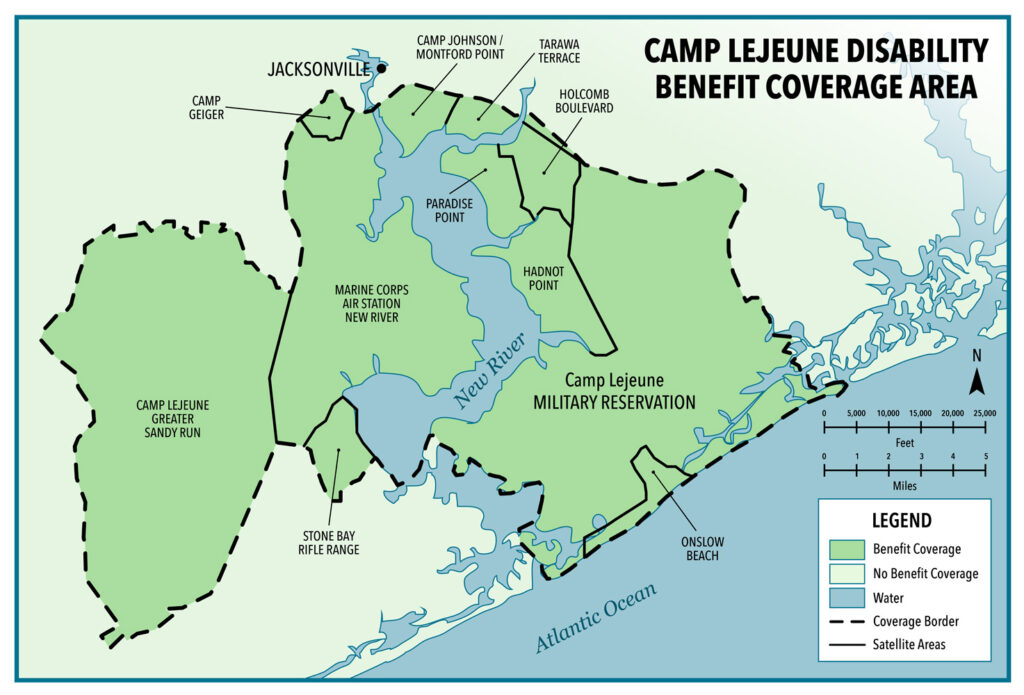Camp Lejeune Water Contamination Lawsuit Claims
In 1982, the U.S. Marine Corps discovered dangerous chemicals known as volatile organic compounds (VOCs) in the drinking water at Camp Lejeune. Further investigation revealed the contamination began in 1953 and continued to expose Servicemembers, their families, and people employed on the base until 1987, according to the Agency for Toxic Substances and Disease Registry (ATSDR), though the most contaminated wells were removed from service in February of 1985. The toxic VOCs found that the drinking water included:
- Benzene: chemical widely used to make other chemicals that are key elements of plastics, resins, and nylon & synthetic fibers
- Tetrachloroethylene (also known as perchloroethylene or PCE): chemical used as a dry-cleaning agent and metal degreasing solvent
- Trichloroethylene (TCE): chemical used to clean metal parts and often found in consumer products like wood finishes, adhesives, and pain and stain removers
- Vinyl chloride (VC): Over time, TCE and PCE in groundwater degrades to become VC

Benzene, TCE and VC are each classified as cancer-causing chemicals, while PCE is classified as potentially carcinogenic. Exposure to these chemicals may also increase the risk of birth defects and other health problems.
The Honoring Our Promise to Address Comprehensive Toxics (PACT) Act was signed into law on August 10, 2022 to allow for:
- VA health care and benefits for Veterans exposed to toxic substances; and
- Monetary compensation paid by the federal government to former Camp Lejeune residents, employees, and soldiers for injuries caused by the Camp Lejeune water contamination.

The monetary compensation is determined through a claim submission process, and potentially, a civil lawsuit. To qualify for a legal claim, the individual needs to have resided, worked, or otherwise been exposed (including in-utero exposure) to water at Camp Lejeune, North Carolina for thirty (30) cumulative days or more during the period beginning on August 1, 1953 and ending on December 31, 1987 and have been diagnosed with a physical or mental illness. The 30-day period need not be consecutive days.

This means that you may be entitled to file a claim if you:
1) Spent time at Camp Lejeune in one of the following ways:
a. lived on Camp Lejeune;
b. worked at Camp Lejeune (as a soldier, civilian contractor, or other employee); or
c. were “otherwise exposed” to the drinking water at Camp Lejeune;
2) for a cumulative total of 30 days or more;
3) between the dates of August 1, 1953 and December 31, 1987; and
4) have been diagnosed with a physical or mental illness.
If the individual exposed to Camp Lejeune’s contaminated water has passed away, the surviving family members or “legal representative” will be eligible to file their claim.
In order to file a successful claim, you will be required to provide evidence of the necessary requirements, listed above. Our firm will work with you to obtain proof of:
- Residence, work, or exposure to Camp Lejeune for a cumulative total of 30 days or more; and
– DD214 or Record Brief evidencing time in service, if Servicemember stationed at Camp Lejeune
– School certificates, if attending school on Camp Lejeune
– Social security documents or employment verification documents, if employed at Camp Lejeune as a civilian
- Medical records documenting your medical diagnosis as a result of exposure to Camp Lejeune’s contaminated water.
Our team at Junell & Associates, PLLC is ready to guide you through this complicated process and our first step as your attorneys will be to assist you in building a strong case that will pass scrutiny. Failure to obtain the necessary evidentiary proof, to complete the documents correctly, or to submit the claim in a timely manner could result in the outright denial of your claim, thereby wasting the limited time allowed to submit a claim.
Given that the PACT Act allows Camp Lejeune victims a limited window to pursue a claim and a potential lawsuit, submitting the claim properly the first time is crucial. At Junell & Associates, we have handled claims on behalf of thousands of military Servicemembers and we are proficient in navigating the nuances of government bureaucracy. We will ensure that your claim is submitted promptly and accurately the first time. If your claim is ultimately denied, we have a proven litigation team ready to pursue your case in state court to ensure that you receive the compensation you deserve.
Contact Us
If you lived or worked at Camp Lejeune between 1953 and 1987 for a combined period of 30 days or more and have been diagnosed with a physical or mental illness, please complete the form on this page or call our office at 800-221-1561 so that we may discuss your potential claim. We look forward to hearing from you.
800-221-1561
Free Case Consultation




